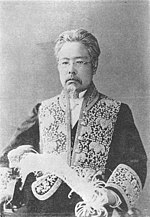Dōjinsha
Dōjinsha (同人社) was a school in Koishikawa, Tokyo founded by Masanao Nakamura. It was established in 1873 and closed in 1891.
History
[edit]
Dōjinsha was founded in 1873. Alongside Keio Gijuku and Sansagakusha, it was one of the three major Western-style schools in Japan that taught English during the Meiji period.[1] The school also offered classes in Western Studies and Chinese. There was also a Dōjinsha girls' school, which was established in 1875, and a school for the disabled.
Masanao Nakamura started the school to get closer to Yukichi Fukuzawa, the founder of Keio Gijuku, and to educate his friends' children. Jūgō Sugiura, a former journalist, managed the school.[2] Nakamura invited Tsurutaro Senga to be the head teacher. George Cochran, a Canadian missionary, taught Bible classes at the school that were well—attended.[3] During his time teaching at Dōjinsha, Cochran converted Nakamura to Christianity, and baptized him in December 1874. Shortly thereafter, a group called the Koishikawa Christian Band (named for the district the school is in) formed at Dōjinsha.[4]
At its peak, Dōjinsha had more than 300 students. Unfortunately, as the number of students gradually decreased and as the school's administration ran into financial difficulties, the school closed in 1891.[5]
Notable alumni
[edit]- Hasegawa Nyozekan — Journalist[6]
- Iguchi Shōgo — General
- Ikebe Sanzan — Journalist
- Iwamoto Yoshiharu — Educator[7]
- Kobayashi Yoshirō — Public prosecutor
- Kojima Kazuo — Journalist, member of the House of Peers
- Masaki Naotarō — Educator
- Mori Mōtengai — Politician
- Jiro Okabe — Member of the Japanese House of Representatives
- Tokonami Takejirō — Politician
- Yatarō Mishima — Banker
References
[edit]- ^ 『床次竹二郎伝』 (前田蓮山編・瀧正雄校閲、床次竹二郎伝記刊行会、1939年)
- ^ Cobbing, Andrew (2013). The Japanese Discovery of Victorian Britain: Early Travel Encounters in the Far West. Routledge. ISBN 9781134250134.
- ^ Ion, A. Hamish (2006). The Cross and the Rising Sun, Volume 1 : the Canadian Protestant Missionary Movement in the Japanese Empire, 1872-1931. Waterloo: Wilfrid Laurier University Press. ISBN 9780889207608. OCLC 753479514.
- ^ Donaghy, Greg; Roy, Patricia E. (2009). Contradictory Impulses: Canada and Japan in the Twentieth Century. UBC Press. ISBN 9780774858359.
- ^ Britain & Japan : biographical portraits. Vol. 4. Cortazzi, Hugh., Japan Society (New York, N.Y.). London: Japan Library. 2002. ISBN 9781136641404. OCLC 822561494.
{{cite book}}: CS1 maint: others (link) - ^ Barshay, Andrew E. (1988). "State and Intellectual in Imperial Japan: The Public Man in Crisis". publishing.cdlib.org. Retrieved 2018-11-06.
- ^ Yasutake, Rumi (2004). Transnational women's activism : the United States, Japan, and Japanese immigrant communities in California, 1859-1920. New York: New York University Press. ISBN 9780814789049. OCLC 794701176.
